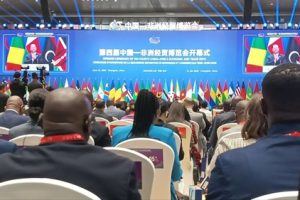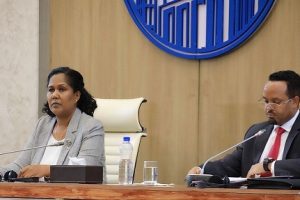BY FITSUM GETACHEW
The title of this article could also very well be the fragilities or weaknesses of democracy. This idea of the limits of democracy is not a new idea because it has been mentioned or cited in many discourses on political thoughts, ideologies or otherwise. There are several kinds of systems of government or running the affairs of a country. A country’s leaders or the people themselves represented by those individuals they choose take part in ways of administering their affairs.
It is often said man (it includes women of course) is simple by nature but he is also very complex and sophisticated animal. He does not know what he wants and when and to administer millions of people under one system has always represented a huge challenge involving so much resource and efforts. Across the centuries man has experienced several kinds of governments or systems and there have been evolution, revolution and other kinds of changes in socio-political and economic systems. Systems that may have worked for a certain people or society may not be suitable to another one.
The historical, cultural, environmental or geographical background of a society may not be ideal for a system rather than another one. The level of public maturity, the level of consciousness, the level of education as well as the level of economic stability all do play in the choice and appropriateness of a system of government. What a third world country people need is quite different from what an advanced state may demand. The foundation of the people, their composition in terms of origin, language, customs, mores etc also influences if not determine what sort of political system may suit it. Hence, there are a multiplicity of choices.
We have often heard about the importance of the need for any government to respect the natural, human rights of individuals. Hence, human rights have become a catch word in any discourse that involves government. The more a system upholds and respects the rights of citizens, the better the system of government.
What are the rights that we want to talk about or intend? Which rights must be ‘given priority’, if at all we try or want to determine a hierarchy of rights? Can we trade one right for another? For instance we have heard that people need to be leading decent life without any form of want or deprivation before or instead of asserting or claiming certain freedoms. This could be freedom of expression, freedom of thought or even freedom of association. Some argue the right to speak or write cannot come before one is guaranteed what one eats or is guaranteed of their life. Health service matters more than freedom of assembly, they say. On the other hand, there are those who argue that anyone who is not mentally free or have their freedoms secured cannot be considered full if only their material needs are satisfied.
This is a tricky choice because the ideal would be to have both freedom and human rights all respected while at the same time they avail of all life’s necessities. But this is rarely achieved because there are competing choices. A society cannot be totally free of certain government imposed or inspired limitations on certain rights in order to better guarantee some form of justice or fairness in society. For instance certain forms of taxes may be imposed on certain categories of people while others may be exempt to level out injustices inherited from previous epochs under previously reigning systems.
For instance the injustices that have been historically inflicted on women and more broadly what may be called ‘minorities’ in any society may need to be now supported more so that they catch up from the ground unfairly lost and attain a common level. Is this acceptable under any system of government? Not necessarily. Some are indifferent to such calculations while others are more sensitive and would embrace such cause and redress it. And for that to happen, which kind of government is needed?
Many would say that democracy may be the best or most ideal answer but democracy, we have experienced it in our own life time, has shown several limits or uncertainties. It involves many actors, many protagonists and it needs patience, perseverance and compromises in order to thrive. Anything that involves the participation of many needs time and protracted discussions. Ultimately the need to convince them so that it sees the light of day is imperative. Agreement is not easy to reach when the actors are multiple and the vested interests are equally numerous and probably diametrically opposed.
Some say an authoritarian system may be easier to implement and practice albeit breaking the hearts of some. Imposing rules becomes easier to apply using force rather than patiently inspiring or convincing millions and attaining their approval. Certainly, democracy by its nature should involve the participation of every adult, a thing you do not need to do in another system of government.
If democracy is a system of government ‘of the people, for the people, by the people’ this system however has so many fragilities that it needs to be nurtured and taken full care of meticulously. It is so vulnerable that it could break. The infinite wishes of the human mind are difficult to satisfy!
To cite just a very timely example, what we have experienced last week in the USA, a country considered by many the bastion of democracy, has shown us how fragile it can be. Many consider the US government as the most successful democracy in the world also because it happens to be the richest and strongest economy in the world. We also observe that Americans pride on the strength of their democratic system and , the independence of their institutions, where the three tiers of government are one independent of the others in a delicate formula they call ‘checks and balances’. No one of the three branches imposes its will on the others.
‘The three bodies, the executive, the legislative and the judiciary are co-equal branches under the constitution’ they say. And it has always functioned well. That was why Americans even dare to ‘export’ their system abroad, at times resorting to conditioning certain states to follow them in exchange for assistance. However, the events that developed on Wednesday 6th January 2021 have evolved to such an extent that they risked creating a dangerous precedent.
A constitutional process was, albeit temporarily, interrupted or disrupted by a ‘protest’. But what was dangerous was the fact that it seemed supported or solicited by the executive! It was inexplicable for millions how a sitting president could be associated even remotely with such ‘protest’ even if protest is part of the allowed system. Many say America itself was founded on ‘protests’, but could the events of January 6 be categorized under this denomination?
There may be various factors that played into the realization of these protests that turned violent with storming of the Capitol where the joint session of parliament was going on. The results of the 2020 election was about to be certified. But the frailties of the system were seen because if there is one ring in the chain missing, if there is laxity in the security, things could deteriorate to unpredictably incontrollable violence!
There have been widespread narratives that the media disseminated alleging the 2020 election failed the test of fairness. This was alleged by the very president who normally would be expected to concede. Such was the tradition. But accepting defeat was too sour to swallow for supporters of the incumbent. And yet it was part of the game and indeed the system.
Who is going to guarantee that this may not recur? It showed how the limits of democracy could be abused if adequate restrictions are not put in place. The interest of the public good was endangered.
Of all countries in the world, why did this happen in the US? Why was there not enough resources to let free expression of thoughts be heard without any violence? The biggest of all losses besides the lives of people was however one of image and prestige. Many advocates of democracy, many leaders in the democratic world expressed their indignation to see the ‘cradle’ of democracy, the temple of the people desecrated! Expressions of solidarity were heard.
The message is potentially harmful for all democracies. It would be wise to learn from it fast. Such weaknesses embolden all those who lurk in the dark trying to seize the opportune moment to act. The consequences could be catastrophic. That is why it would not be inappropriate to define democracy as fragile and needs to be duly nurtured. It can be abused by authoritarians and anarchists!
We have seen several times failures in adopting a free democratic system in several third world countries, but it was always stated that what they did was nowhere near the American system, considered a symbol. But now there could be disappointments and the repercussions are to be felt, especially when there are post election disputes in a peaceful transfer of power. It is for many a warning that there should always be caution when similar things begin to emerge.
The rhetoric of political leaders is always important and leaders need to heed what the implications could be in a world where some disillusioned followers are capable of creating havoc and destabilize their country. We have seen that materialize constantly in many African countries, and we have also seen the costs.
The Ethiopian herald January 14/2021




